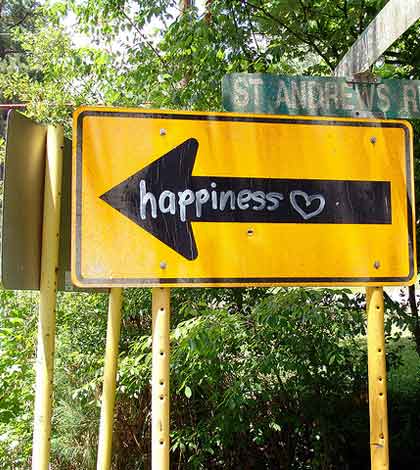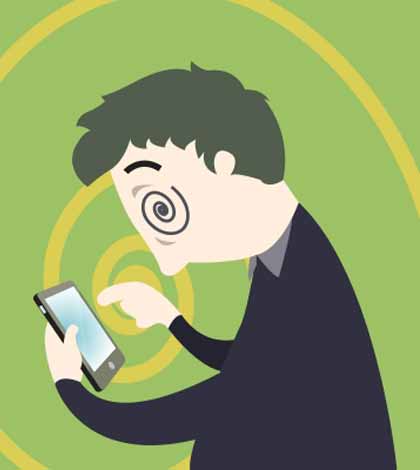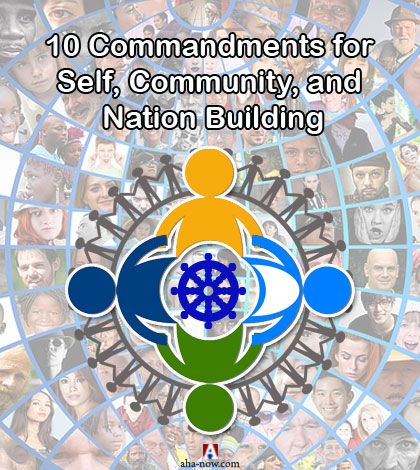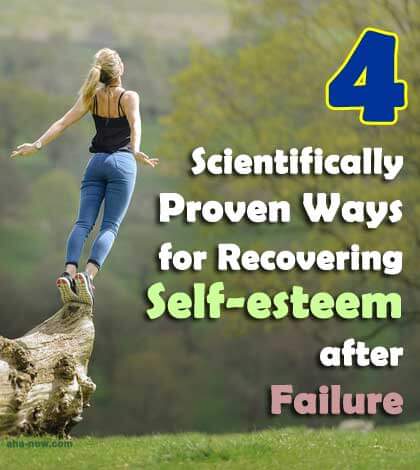Why Our Ideas About Happiness Are Backwards

This is a guest post by Kira Newman. She is a digital journalist and among other things, she also writes about happiness.
Why is it so hard to achieve happiness? Maybe we are thinking about it backwards.
In a TEDx talk, entrepreneur Nataly Kogan tells a familiar story: after growing up poor, she decided that she needed money and success to live a happy life.
She believed: If I get the things I want, I will be happy.
Nataly worked hard for 20 years until she was driving around in a fancy car, pushing her daughter in a fancy stroller, and living in a fancy house. She “had it all,” but she was unhappy and exhausted.
This was a shock to her, but it is not a shock to psychology researchers.
In the late 90s, a comprehensive review of happiness science found that circumstances account for only about 10% of our happiness.
Maybe we dream of moving to a more beautiful city, where the weather is nicer. We believe we’d be so much happier there, and we imagine long walks in the sun or cool afternoons in the shade.
But according to studies, climate has no effect on our happiness.
Maybe we dream of getting a better job and making more money. We think about eating out at gourmet restaurants and buying expensive toys for our kids.
But again, we are probably mistaken. One famous study revealed that after $75,000 a year, making more money does not make us happier.
Maybe we dream of being more beautiful, with shiny hair and dazzling eyes. Or we lament our aches and pains, our creaky knees and sore backs.
As hard as it is to believe, the science proves us wrong. Objective health and physical attractiveness have little effect on happiness.
How can this be? It is because of something called adaptation, the way we quickly get used to our life circumstances and start to take things for granted.
Studies have shown that we adapt to getting married within about two years and to winning the lottery within one. The initial glow of true love or a big jackpot wears off, and we return to our old happiness levels.
We start to get annoyed by life’s little hassles again.
In fact, psychologist Daniel Gilbert wrote a whole book about how terrible we are at predicting what will make us happy, called Stumbling on Happiness. “We seem to know so little about the hearts and minds of the people we are about to become,” he wrote.
Psychology blogger Britt Reints is another great example. In her TEDx talk, she shares a similar story to Nataly’s. Years ago, she had a kind and generous husband, plenty of money in her bank account, and a strong community at her church.
But she was desperately unhappy, so unhappy that she thought she wanted to divorce her husband.
How did she overcome her struggle? It was not by finding a better husband or making more money. It was by changing her attitude.

Flipping Happiness Upside-Down
The main life change Britt made was deciding to live authentically.
She would no longer do what she was “supposed to” do; she would follow her heart and her values and live a life that was genuine.
She also started a gratitude practice, writing about her “happiness highlights” on her blog.
The science shows that practices like gratitude have a much bigger impact on happiness than our circumstances.
If circumstances account for 10% of our happiness and genetics account for 50%, voluntary practices and behaviors account for as much as 40%.
We spend all our time chasing after money and success, thinking it will bring fulfillment, when the real way to get happier is to change our thoughts and feelings. For example:
- Grateful people are happier: Practicing gratitude changes our perspective, so we are more likely to notice and focus on the positive things in our lives.
- Kind people are happier: We actually get more happiness out of spending a small amount of money on others rather than on ourselves.
- Mindful people are happier: We are happier when we are paying attention to the present rather than distracted by thoughts about the past or future, even if they are
- Forgiving people are happier: Learning to let go of past grudges and move on with our lives releases us from lingering negative emotions.
- Self-compassionate people are happier: We find more peace when we can drop the critical voice in our heads and show ourselves love and understanding.
When we become happier through gratitude, mindfulness, kindness, and other practices, then something funny happens. All those things we want – to have a great marriage, to lose weight, to get a promotion at work – are suddenly much more likely to happen.
Happy people are more likely to get married, have fulfilling and loving marriages, and not get divorced. Happy people have more social support and more friends. Maybe we do not need a relationship to make us happy; maybe getting happy will help us build better relationships.
Happy people actually have better health – less chronic pain, more active immune systems, and less chance of diabetes or a stroke. They even live longer, as much as seven years more. Grateful people sleep a half hour more every night and exercise 33% longer per week.
Maybe we do not need to lose weight to be happy; maybe we’ll be more motivated to lose weight once we are happy.
Happy people are more creative and productive. They have better job security, and they make more money than unhappy people.
The lesson? If we want a promotion to make us happy, stop waiting; get happy first, and then we might get that raise.
All of this is so counterintuitive because it goes against many of the things we hear from our parents and society.
We are taught to make more money, succeed, get married – and then we’ll have a good life. It is hard to believe that the happiness comes first, and hard to imagine happiness without all these things.
These findings are the reason why I created The Year of Happy, a free online course in the science of happiness.
It starts January 1 and pulls readings and videos from across the Internet so you can learn to be happier in a simple, low-commitment, fun way (2 hours a week). Each month focuses on a practice in the 40% category: things like optimism, gratitude, kindness, forgiveness, and savoring. I’d love for you to join, become happier – and then see all your wishes come true.
Over to You –
What is your idea about happiness? How do you try to be happier in life? Share in the comments.
Photo Credit: Mike Rastiello, FreeDigitalPhotos
(Dear readers, we were compensated for publishing this post, and because it contains value, which will be useful for all the readers of Aha!NOW, we agreed to do so. This is a step towards discovering and spreading happiness, which is the prime objective of Aha!NOW. Thanks).
Disclaimer: Though the views expressed are of the author’s own, this article has been checked for its authenticity of information and resource links provided for a better and deeper understanding of the subject matter. However, you're suggested to make your diligent research and consult subject experts to decide what is best for you. If you spot any factual errors, spelling, or grammatical mistakes in the article, please report at [email protected]. Thanks.











Hi Kira Newman,
wow! this is really a beautiful post….i am totally agree with you, i am feeling happy after reading this post….great ideas are available here….Happiness is right of everyone…life is not possible without happiness so happiness is the most essential feature of life. you must have positive views in your mind because your positive views creates positive energy and then positive energy creates happiness so develop your positive views. Grateful people are happier,Kind people are happier,Mindful people are happier,Forgiving people are happier and Self-compassionate people are happier are the best topic of this post….very very thanks for sharing this……
Thanks again!
From-
Amul Sharma
Hi Amul,
Thanks for reading!
I liked that you said, “You must have positive views in your mind because your positive views creates positive energy and then positive energy creates happiness so develop your positive views.” It’s definitely a cycle. With gratitude, for example – if you try to be more grateful, you’ll feel happier, and then you’ll feel like you have more things to be grateful about.
That’s what’s great about all these practices – they reinforce each other and set in motion something good 🙂
Cheers,
Kira
Hi Kira,
Happpiness… So many are chasing the ideas they think will make them happy they end up making themselves miserable chasing things instead of realizing what you have is a blessing!
It’s a mindset that is created from insecurity and / or fear. But it can be changed if we just learn that things never make us happy. Only the people we love and who love us can do that. Happiness is found in relationships that are important to us.
I learned as an Army Chaplain that if you want happiness that lasts then be willing to make others happy and focus on them instead of on yourself. The root of happiness is in giving, not receiving.
Fantastic post Kira! Your article made my day!
~ Don Purdum
Hi Don,
Thanks, that’s so nice to hear! I’m glad my article brought a smile to your face.
I’ve heard that there are only two motivations in life: fear or love. In the end, you’re either doing something out of fear or doing it out of love – whether it’s pursuing a career, continuing a relationship, or chasing happiness. Of course, it’s obvious which one of these motivations is healthier.
What you say is interesting – maybe pursuing external things to make us happy is a kind of fear or insecurity. We worry that by ourselves we’re not enough, we can’t just be happy as we are, and we need all these external supports. The kind of internal happiness that comes from loving yourself and others is more secure and stable.
Cheers,
Kira
Hi Kira,
Welcome to Aha!Now and it is a pleasure meeting you here!!
I really enjoyed reading this post!! This sentence summarize the whole post: “The science shows that practices like gratitude have a much bigger impact on happiness than our circumstances” and this is very true as a grateful heart is a joyful heart.
In my humble opinion nothing like gratitude can make us happy as it changes our mindset and attitude to see things from a positive perspective.
Thanks Kira for a great share and a pleasure meeting you. Thanks Harleena for inviting Kira to write such a powerful post. I enjoyed it so much.
You both enjoy the rest of your week.
Be Blessed,
Neamat
Hi Neamat,
Thanks for the welcome!
You’re right, gratitude is so powerful. One of the gratitude experts says that it’s so much more complex than we think. Once you start thinking gratefully, all these positive changes take place. You see more and more positive things in life – suddenly, a little flower or a smile is so meaningful. You begin to notice all the people who have helped you in life and you feel appreciation for them. Every day becomes a gift rather than a chore. Life seems good and worth living for.
Great to meet you, too,
Kira
Hi Kira
Welcome to ABC. This is most certainly a wonderful post. I agree that we are not certainly good in knowing what makes us happy and I nodded in agreement that even when we have so much wealth it does not transcend to a happy life.
Happiness to me comes from within. It isn’t affected by an external force. You don’t need to have everything going on for you to be happy. People fill sad and burnt out because they tie their happiness to a lot of things.
Being grateful, kind, forgiving, compassionate and mindful does lead to a happy life. Thanks for sharing. Have a wonderful week
Hi Ikechi,
Thanks for the welcome.
It’s funny that we pursue external things to be happy, because all around us there is proof that that’s the wrong strategy. I’m sure we all know people who seem to have everything in life, who are rich or have awesome jobs or have the best relationships, but aren’t happy.
We also know people who have almost nothing but seem to be joyful and content. That alone should give us a clue!
Cheers,
Kira
Hi Kira Newman,
You know some thing, I really have a very big mouth haha. Not much big.:) Happiness is the main thing in life. I always like to be happy, but sometimes things actually changes and turns bad!!
When I was standing in the middle of things going wrong then it is easy to get a bit panicky. To lose faith and abilities.
Then look to the past for a bit of strength and confidence in what I you can do great, or even much more than the better. Doing this helps me to feel like I am standing on firmer ground again. And sometimes I can even find a solution I used for another challenge in the past that I can reuse or readjust to get me out of this situation too.
Happiness helps me to relax, to zoom out and setback in a larger perspective and to see that even though it is a big thing right now it will most likely now but after it is simple.
Happiness always,
Siva
Hi Siva,
Thanks for your comment!
You touched on the idea of confidence, which is huge for happiness. At the end of the day, in order to be happy, we have to feel that we’re capable of dealing with whatever life throws at us. We have to believe that we’ll be okay, no matter what happens.
Strangely enough, the way to develop that feeling is to experience adversity and then overcome it. “What doesn’t kill you makes you stronger.” Then, like you said, you can look back on what you’ve done in the past and feel confident in the present. You can see that obstacles that seemed huge before but are not longer important.
Best of luck in your happiness journey,
Kira
Achieve to be happy? Or, happily achieve?
Like you Kira, I believe in the latter. If “more stuff” isn’t the only vehicle for feeling happy, you have room as an influencer to ask a question like . . .
As a result of the influence I’ve applied in the world, am I and those around me more or less completely satisfied with the way we are in the world? In relation to one another, in relation to our own lives, in relation to the planet at large, in relation to how the whole thing seems to be moving forward, am I more or less satisfied with all of that today than I was yesterday?
If my influence isn’t making me more satisfied today than I was yesterday, then I don’t have any interest in doing it.
If the only metric I have is “More stuff” than I can never be more satisfied because no matter how much I have, the “more stuff demand” gets bigger and this introduces more stress and demand into the system so the system burns itself out on its own consumption of desire.
More Satisfaction; not more objects or money or lovers, etc. Quantitative to Qualitative.
If I’m not as satisfied as I need to be then I ask, “What would make me more satisfied?” And sometimes what makes me more satisfied is doing nothing.
And the cool thing is that you can shift quickly as to what satisfaction means today whereas happiness from the next bigger object may not manifest for days, weeks, months, or even years.
Thank you for reminding me that the name of the game is progress, not perfection. 🙂
Hi Lewis,
I like the idea of “metrics.” We all have these unspoken or unidentified rules about what we believe is important in life (often money or success). For me, it was “productivity” – I believed that I had to be working all the time, that the value of a day was measured by how many hours I worked or how much I got done.
But like you said, we can adopt other metrics. We can work toward satisfaction, or happiness, or relaxation. But it will require a big change of habit – if you’re used to measuring success one way and then try to change, you have all these old patterns of thinking and feeling to counteract. I still have habitual thoughts like “I’m wasting time” or “I need to work” when in fact I should continue enjoying whatever I’m doing.
You said “the name of the game is progress, not perfection” – exactly! Very good summary.
Cheers,
Kira
Hi Kira
The features that make one happier are not fully known to all that is why many people instead of forgiving just pine in revenge and ever wonder why they are not happy.
Many others just see what they don’t have and forget to note what they already have and always complain of being deprived of real happiness in life.
Another group instead of looking at what they have just look at what others have and jealously swallow the tiny sense of happiness.
I once read somewhere happiness lies inside you and it all depends upon you how to extract it by taking the life as it is and not as it looks to you.
Thanks for sharing this wonderful post.
Thanks Harleena for featuring her to make us read a great post.
Hi Mi,
Thanks for reading!
You talked about a lot of distinctions – essentially, people who either know how to be happy or don’t, people who are positive or not.
It’s easy to spot those positive people, isn’t it? They just light up with energy and warmth. We are automatically attracted to them. They make us feel like the world is good and we can accomplish things.
It’s nice to know that with effort, we can cultivate that attitude and become one of those radiant people.
Cheers,
Kira
Hi Kira,
Thanks for sharing it Harleena!
I think the definition of happiness keeps changing with time and experiences. As you move forward and get whatever provided you happiness. You get used to it and then you want more. In an analogy I would like to point out that speed lovers, they do not usually like high speeds as perceived, but its the acceleration that provides adrenaline. Same is the case with happiness and achievement. Its the way you move forward to achieve anything and when you get to it you are then clueless.
Same is the case with relationships. At first you want to just talk to the person, the you want to make a connection then kissing, physical love, marriage, kids and then the glass is full and you do not know what to do anymore. And the happiness is gone. I would say the key to stay happy is to keep a goal, work for it and not be satisfied. Try to move as quickly as you can towards that goal.
Thats my two cents on happiness
thank you Kira and Harleena 🙂
Hi Navneet,
Thanks for reading.
I really enjoyed reading your comments, particularly about speed and acceleration. It raises a good point: we need the feeling of growth to be happy. We think we want to reach goals, but what we really enjoy is the journey – feeling like we’re working toward something, having a sense of purpose.
There’s a nice quote that says: “Happiness is pretty simple: someone to love, something to do, something to look forward to.”
That’s why we often feel lost or empty when we achieve a goal – we don’t know where to go next! That’s normal and we should always be thinking about next steps.
Cheers,
Kira
Hi Kira,
Nice to meet you here on Harleena’s blog. What a great topic: Happiness!
I would call myself a happy person and as I read along the points you made about people that are happy, I resonated with it. One has to be living in gratefulness. Being mindful of everything we have to the smallest thing, with a grateful mind makes us happy.
I do have a happy marriage (finally lol) It took me a while to accept to be loved, but I did break through and allowed it. 24 years of bliss and friendship.
I also find that if we truly forgive others we have a happier heart. No matter what has happened to us, if we carry around that energy of hate, it just will eat us up. Even in the worst circumstances, we can forgive and if that person is toxic or abusive, we can set up a boundary.
Thank you for a wonderful article,
-Donna
Hi Donna,
I’m glad the ideas in the article spoke to you!
Wow, congrats on 24 years! I didn’t go into detail, but it’s amazing how our relationships change when we become happier. They say that when we’re unhappy, we focus inward – we’re constantly analyzing our feelings and we have little time to pay attention to others. But when we’re happy, we can open up and give more to the people around us. We no longer believe that we need other people to change for us to be happy; we realize that it wasn’t them making us unhappy in the first place. The happiness is within – and then it radiates outward to the people around us.
In gratitude,
Kira
Hey Kira,
This was a great post about happiness! I do believe a lot of us have this thing called happiness really backwards.
Yes we do live in this physical and we can gain these materialistic things. I mean,we’re material, but if we don’t lay out the foundation of being happy then we conjure of those negative feelings that we definitely don’t want.
As far me, sometimes i get into that depressed, negative mood. But what helps me is to listen to that motivating voice inside of me and also put myself in a place of peace and happiness. I believe that place is what connects us to the universe. Everytime I think of that, I think of the Star Wars trilogy where Yoda reminds Luke Skywalker to use the FORCE. That FORCE is within all of us and that’s where the our personal power is!
Thanks Kira for the inspirational post and Thank You Harleena for having her as your guest blogger!
Hi Sherman,
Thanks for reading!
“Connecting to the universe” is an interesting concept. I think when we are unhappy, we tend to feel very alone. We think we are the only ones in the world who have felt a particular feeling. We think our stress, or our problems, or our sadness is so much worse than what our friends experience.
But actually, sadness is so human. Everyone has their problems. When you’re feeling down, it helps to remember that you’re not alone – that there are many, many people who are also feeling as you do, and many, many people who have felt that way before and overcome it.
Cheers,
Kira
Hello, Kira,
It’s nice to meet you here on Harleena’s blog. What an awesome article, I really enjoyed it. I definitely agree with your points. Money does not buy happiness as there are a lot of things it can buy, but not good health, a home in heaven or happiness, that’s for sure.
It can certainly help if someone does need to move to a particular climate for health reasons, however,
You mention an interesting term – “initial glow,” and I can think of many situations that can refer to. Lots of ideas filled my mind. The initial glow of a new toy, and then the child ends up playing with and enjoying the box it came in more.
Making a lot of money by putting in 75-80 hours per week does not leave time to enjoy the money or have a life style that is balanced.
Yep, the gratitude attitude is a winner. It’s a biblical principle so I’ve been encouraged to have it for a long time and taught the ill effects of the opposite type of attitude.
You are spot on, Kira, as people that don’t learn to forgive are filled with the poison of bitterness, and it just rots them from the inside out. Physical ailments can result – so sad.
Your points and research were so interesting, and I agree with your message. I’ll definitely be sharing, so thank you.
– Carol
Hi Carol,
Nice to meet you as well!
Thanks for picking up on the “initial glow” term. We all feel that, right? I didn’t mention this in the article, but there are actually some techniques for extending that initial glow, particularly gratitude. When we take the time to be grateful for something, we can actually counteract the process of taking things for granted and derive more joy and pleasure out of something. But it requires us to be deliberate and take the time to recognize the good things we have.
Also, there’s some research that we adapt less to experiences than we do to material things – so while we may get used to our new smartphone quickly, we’ll enjoy a vacation or a new friend longer.
Thank you for sharing this post!
Best,
Kira
Hi Kira,
Thanks for this amazing post 🙂
Happiness is something that most of the people find here and there but they never feel in them. I think happiness is something that one should feel. In today’s life where everyone is busy on their stuff, it’s become really difficult to manage the time to do such things which make you happy but to enjoy the life we have to do.
In very nice way you have explained these stuffs. Thanks for sharing.
Regards,
Ashutosh Jha
Hi Ashutosh,
That’s a really good point. We can always find little pleasures here and there, but what we really want is to raise our baseline level of happiness – to be more content overall. Getting a new job or a new relationship will boost our mood temporarily, but it will ultimately go back to “normal.” And it’s our attitude that determines how happy that “normal” level is.
Thanks for reading!
Kira
Thank you Kira for this amazing post. I have arrived here via Nathaniel’s fan page and am very happy I followed the link!!
Happiness is something many people chase, and it can be there, right inside them… they just have to let it bloom and not keep squashing it with ideas from the head and society.
I love all your research and examples from real-life and you have put this all together in such away, that I think anyone unhappy would love it!
I believe happiness is the beginning of all things good, and as you listed above, being grateful, kind, mindful, forgiving and self-compassionate are the ways to finding it.
Happy comes from within.. not from things or achievements.
Will definitely be joining ‘The Year Of Happy’
(and sharing and saving this post on Pinterest)
Jacs 🙂
Welcome to my blog Jacs! 🙂
I’m glad you like the post by Kira. Regarding happiness, it’s said that its like a butterfly, the harder you chase it, the further it gets away. But when you sit still, it may come and sit on your shoulder.
As you rightly mention, the real fact is that happiness needn’t be chased but grown and cultivated from within. Be still by controlling the turbulence of your mind and heart and with so many other factors that Kira would reveal to you in her happiness course.
I’m so glad that we think on the same frequency as I agree with everything you’ve written about happiness. Thanks for visiting and sharing your thoughts on this post. Hope to see you around. 🙂
Hi Jacs,
Thanks for signing up for The Year of Happy! Glad you’ll be joining us all on a happiness journey for 2015.
I like your metaphor of letting happiness “bloom.” Like Harleena says, it is grown and cultivated. It takes time. We have so many habits of feeling and acting and they won’t change overnight, as much as we might want them to. And during the process, it’s important to be compassionate to ourselves and not feel like we’re “failing” because we’re reverting to our old habits. The best way to get happier is with humility and patience.
This quote about “chasing” could be applied to happiness: “Slow down and everything you are chasing will come around and catch you.”
Cheers,
Kira
Hi Kira, Welcome to Harleena’s place!
Outstanding article about happiness. You’re right, when we struggle with life, it’s easy to focus on what’s wrong instead of what’s right. But even in the darkest of times we can usually find something to be happy about. Gratitude is key, so relish that the glass is half full without wishing you could have a full glass.
I also like how you point out that we acclimate to changes in circumstance so that when we do things to try to make ourselves happy we soon that that for granted. Believe it or not, we see it all the time in tech. People covet the latest tech gadget until tomorrow when a newer one comes out! If you need a new gadget, then get one, but if there’s nothing wrong with the one you have, then appreciate it!
Thanks so much, Harleena, for having this gem Kira as a guest author here!
Hi Carolyn,
Thanks for the welcome, it’s great to be here!
Yes, adaptation is so interesting. What I also find interesting is that as hard as we try, we can’t predict it. For example, if someone told us that we would get used to the latest new phone, we wouldn’t believe them! We would insist that it’s so much sleeker or faster or has X feature that we really want. We try to convince ourselves that we’re the exception and we won’t take something for granted – but of course, we eventually do.
There’s a great book on this topic called “Stumbling on Happiness” that details all the ways our brains have trouble predicting what will make us happy. You might enjoy it!
Cheers,
Kira
Hi Harleena and Kira. 🙂
Happiness, to me, involves having certain freedoms as well as being at peace with yourself, being the best person you can be, and treating others how you’d like to be treated.
I think I’m a pretty happy person… now. But it wasn’t always this way.
I used to be depressed to the point where my thoughts were consumed by suicide. I was diagnosed with major depression, then as being bi-polar.
I’m not proud to say that I don’t take medication at all, have my own writing and editing business, and a great relationship with my son.
Things are good.
In fact, things are very, very good.
I have many online supporters and blogging friends.
I’ve connected with tons of great people since acquiring my computer in January of 2013.
I also love helping others, am a teacher, and now I’m even a published author. Sure, self-published, admittedly, but published somehow nonetheless!
I began a gratitude journal and recite positive affirmations. It’s hard to believe the power they wield!!!
My life has improved tenfold since I began doing these last two actions.
I’m learning more than ever before, too!
Life is pretty great.
I always advise to others to focus on what they have instead of what they don’t, and have practiced what I preach, too.
It’s nice to meet you, Kira, and thank you, Harleena, for introducing your readers to such a wonderful guest!
Hi Lorraine,
Wow, thank you for sharing your experience!
When talking about your life, you hit on so many of the vital aspects of happiness: relationships, generosity, finding a meaningful career, gratitude. You’ve got the right approach.
I have a friend who believes there are 4 vital aspects to happiness: relationships, work, health, and finances. If he’s unhappy, he tries to figure out which one of those areas is lacking. Life requires balance and sometimes we aren’t devoting enough time to one aspect.
Nice to meet you too!
Kira
Hi Kira,
Welcome to Aha!NOW. This is truly an insightful article. I agree that our ideas about happiness are backwards. It always seems to be that “next thing” will make us happy but unfortunately many people keep chasing that “next thing”.
This could be a new house, new car, promotion, the lottery, and the list goes on. But as you stated, we easily adapt to all of these “wants” and never seem to achieve any level of long term happiness. It seems we live in a “I am never satisfied” society these days.
I believe that we really have to take the opportunity to get to know who we are on a deeper level. I mean, who are we when we peel back the new clothing, new home, new car, and all of the other stuff society tells us we need in order to be happy.
You listed 5 wonderful attributes that we all should aspire to be. All of them I believe would give us more peace and happiness in our lives if we practice them. Think about it – When we are kind to others, grateful, compassionate, forgiving, and mindful we place ourselves in a better place mentally. It is like we are serving others and I do believe that serving others can truly make us happier. I did that for 25 years in the military and that was probably the happiest years of my life.
You make a great point that happy people are typically healthier, more productive, creative and in my view more social. Why would we not want that for our lives. I believe we can all use this wonderful article to examine ourselves and even do a better job at understanding who we are as people and how to attain even more happiness. Thank you for sharing.
Hi Nathaniel,
Thank you for the welcome!
I like what you say about getting to know ourselves. It’s something that I mentioned in an earlier comment about Brene Brown – our happiness and self-worth can’t depend on our job, our house, or our relationships. To be truly happy, we have to feel a profound sense of value – that we mean something, independent of all our titles and roles. We need to embrace the journey, when we aren’t quite who we want to be but we are working toward it. Life is about growth.
25 years of military service – bravo to you! I’m not surprised that the structure and the sense of meaning you got from that experience made you happy.
Best wishes,
Kira
Hi Kira,
The struggle to find happiness is something all of us go through. And yet the irony is it is within us always. All that is needed is to feel abundant and grateful inside and it manifests in your external world.
You have captured this beautifully in your post! Posts like these help remind ourselves of what’s truly important and meaningful.
Thanks for Sharing!
Hi Nikshep,
Thank you! I like that you say “it is within us always.” I do some meditation and the teacher always says that calmness is the natural state of the mind; all we have to do is allow our minds to return to that state of calm. Maybe that’s a good way of thinking about happiness – it’s always within us, it’s natural. With acceptance and letting go, we can return to it.
(It may be more complex, but thinking about it that way can be a useful tool.)
Cheers,
Kira
Enjoy the celebrations!
Loved it. It’s so true. Attitude and gratitude do more than all the possession’s one can possibly have.
Thanks Nicolas!
My pleasure Kira,
I could have written a lot more on this subject, but I am insanely busy.
My daughter’s wedding is on the 18th.
Festivities begin on the 16th.
I am in a bit of a daze.
Hope to be back to the community before Christmas, but with new in-laws etc, seems a very busy time ahead.
All the best.
Thanks,
Nick
Hi Kira,
It is nice to meet you here and talk about the most important aspect of life! We all go far and wide in search of happiness, we chase it in the form of success and career, we have high hopes that a day will dawn when we would be happy! What we fail to understand is that happiness is our shadow, it follows us while we are chasing it, it sits in the corners of our heart while we keep on searching it far and wide, it tiptoes into our lives and we fail to notice it. It never gives us an opportunity to welcome it because it lies within…we have to recognise it, talk to it silently and calmly. It resides in our thoughts, in our actions if they are good!
You have explained all this so well with examples and I feel the generation ‘X’ needs to read this post very carefully to digest all the words! Having said that, lets not forget that there is no short cut to happiness because the path begins from our own self. At the same time that path is quite crooked and curvy. It may confound us, it may take us astray, especially if we focus on materialistic, scientific and technological world!
Have you noticed that some people are born happy and some are raised in such a manner that they start understanding the value of happiness quite early. So our environment and peer group too play a significant part in making us happy.
Thanks for sharing your wise view and thanks to Harleena for inviting such a prudent writer. Have a happy and blessed week!
Hi Balroop,
Wow, you describe it so well. Your first paragraph is so beautiful and poetic!
You’re right that it’s not easy. That’s one thing I worry about when I write about the science of happiness – these ideas may sound simple, but they’re so hard to put into practice. Often we know what we “should” do to be happier, but it’s hard to bring ourselves to cultivate new habits and change the way we think.
I realized recently that we inherit a model of happiness from our parents. We may think we know what happiness is, but eventually we may realize that happiness is something different from what our parents taught us. I had this experience myself, and I’ve started to explore other ways of looking at the world.
Have a happy week yourself!
Cheers,
Kira
Hi Kira,
Thanks for a wonderful post on happiness. I am very glad to meet you here on Harleena’s blog!
I completely agree with your post on why the general ideas on happiness do not work for people and why they need flipping over for a better understanding of what makes people happy.
I have also been very interested in the science of creativity, happiness and motivation over the years in addition to my work as a science researcher in Biology. Not to mention, I love posts that speak to the science and art of happiness.
As you mentioned, many popular ideas on happiness need redefining. An important one of those is the idea that is echoed by what Shawn Achor and other researchers are saying that happiness does not follow success. In fact, science is showing that it is the other way around. Get happy first and success follows more reliably. This is a radical idea on many counts because we have been conditioned to believe the reverse is true. And unfortunately, the conditioning runs deep. To be honest, the ancients have always been echoing this sentiment. Yogis and wise people of all ages have been saying that going inwards and creating situations that favor the facilitation of happiness are more effective in the manifestation of happiness.
I love the examples you provided. Particularly the following of authenticity by Britt is commendable. I believe that going into the work of authenticity and guilt/shame researcher Brene Brown pretty much says the same thing. In fact, I love Brown’s quote: “Owning our story can be hard but not nearly as difficult as spending our lives running from it. Embracing our vulnerabilities is risky but not nearly as dangerous as giving up on love and belonging and joy—the experiences that make us the most vulnerable. Only when we are brave enough to explore the darkness will we discover the infinite power of our light.” ― Brené Brown
It is this embracing of radical authenticity that is very scary to many people. After all, we have all been shamed and guilted by others when we supposedly did not live up to another’s standards. In my creativity study, the same thread of fear of being authentically creative runs through people. Again, they were shamed when they were little and fear expressing their true creative powers.
I really like that you mentioned that we are still empowered by happiness research because despite genetics and circumstance, we are still able to enhance happiness upto an astonishing 40%. This gives a lot of hope to people who desire to increase their happiness levels and their happiness set points. And as the Dalai Lama once spoke so wisely in a live event and I am saying it in my own words: If we have hope, we have something and if we lose all hope, we have nothing to hold on to.
Thanks again!
Harish
Hi Harish,
Thank you for sharing all your thoughts! It is interesting to hear that you’ve studied the science of happiness. Shawn Achor is a funny and smart guy! 🙂
I’m so glad you brought up Brene Brown! I read two of her books recently and they resonated with me deeply. Being authentic can be so difficult – I’m definitely guilty of living for a long time the way I was “supposed to.” I still have to fight the voice in my head that says I “should” do this or that, and try to figure out what I want to do.
Ultimately, Brene Brown says we need to believe that we are worthy, that we are enough, just as we are. That is so crucial for happiness – if you are constantly striving to be someone better or to be in a better situation, you will never be content with today. It’s always a balance – recognizing you have room for improvement but being okay with the journey and the now.
And the 40% figure is definitely encouraging. Genetics might play a huge role, but we have a lot of control over how we feel. If you feel very low, imagine if we could be 40% happier than we are today! That would be revolutionary.
All the best,
Kira
Hello KIira,
Welcome to Harleena’s blog. It’s very nice to meet you.
This part of your post hit home for me because that’s what happened to me:
“When we become happier through gratitude, mindfulness, kindness, and other practices, then something funny happens. All those things we want – to have a great marriage, to lose weight, to get a promotion at work – are suddenly much more likely to happen.”
As soon as I changed my mindset all kinds of great things have happened. It’s not to say I don’t suffer any setbacks. God knows I do. But I can handle them more easily now.
A long time ago I thought what mattered was my “status” but then I realized what truly made me happy wasn’t the material things at all.
Now it’s the small things like my grandson grabbing my face or hearing my kids hanging out together laughing that make me happy.
Lovely post. Thank you for sharing it with us. Have a great new week ladies!
Hi Corina,
Thank you for sharing the part that resonated with you! It’s always interesting to hear what readers respond to.
I think some people worry that focusing on happiness is selfish, but this is a good reason why happiness can be as beneficial to other people as it is to you. If you are happier, your relationships become happier – making your family, friends, and spouse happier. If you are happier, you can attain your full potential and create beautiful things through your work that touch the lives of many people.
I’m always reminding myself that setbacks are inevitable, too. Life is not a straight path upward; it’s a little more windy and jagged. Even though I’ve been writing and thinking about happiness for a long time, I still have bad days and get in bad moods. But now I feel like I have some tools to deal with them.
Have a great week yourself!
Kira
Hello Kira, Nice to meet you here at Harleena’s blog. I just love this subject, what a great way to start my week!
I do believe that happy people do build better relationships with others. It does have a lot to do with our mindset, not how much money or material stuff we have HUH?
I love how you talked about starting a gratitude journal, this has helped me overcome so many challenges the past few years.
It is amazing how much you have to be grateful for when you put your words down on paper.
Wishing you the best of luck and happiness for the new year ahead.. Chery :))
Hi Chery,
Glad this helped you start off your week right!
I did gratitude journaling for a while, and lately I’ve tried some other techniques. For example, I tend to ruminate and worry sometimes, particularly when I have nothing to think about. I decided that when I caught myself worrying, I would think about some things I’m grateful for. So most nights, as I brush my teeth, I try to reflect on the positive things that happened that day.
Yesterday was a bit of a hassle for me – I am coming down with a cold and I was traveling, which is always stressful. I thought I didn’t have anything to be grateful for, but as soon as I started thinking about it, many things popped into my head. It made me see the day in a different way.
I’ve also started emailing a friend with the things I’m grateful for, and he emails me back his list. That way, we build our relationship and are accountable to each other for being grateful – a win-win!
Enjoy your new year as well!
Kira
Hi Kira AND Harleena. I love this post! (of course I do because I write about stuff like this all the time myself!) It is so important to remember that happiness doesn’t come from what is outside of us–but rather we generate it ourselves and then more and more good things happen through us and to us! Thank you for these excellent reminders.
And for anyone who is worried about being TOO positive like a person who commented on my blog was–Positivity is NOT a cult! Anyone who is interested, can read the “quick quiz about the cult of positivity” post on my blog. (link removed by admin as they are not allowed in the comments)
Your course sounds like a great way to keep people trained on happiness. ~Kathy
Hi Kathy,
That’s a really good point. I just finished taking a course on the science of happiness, and that was one of the themes: happiness doesn’t mean the absence of negative emotions. In fact, we often feel even more unhappy when we believe that we should be happy all the time, that if we’re not happy then we’re doing something wrong.
Negative emotions can be a signal, and it’s important to take time to feel them and to listen to what they’re telling us. And it’s surprising, but when we accept negative emotions, they don’t hurt so much! Lots of the pain comes from our judgments and feelings on top of the original emotion.
I followed you on Twitter – nice to connect!
Kira
Hi Kira,
I just love this advice! Happiness Upside down really defines the truth about happiness. Find happiness within ourselves first, then find it in other people and things. Otherwise we’re trying to fill an empty pit. 🙂 As a divorced woman I can tell you that I am way happier now than when I was married. The reason? I’m authentic and true to self. Your course sounds wonderful! Maybe I could do a promo for it later this month on my website? I think some of my readers may be interested since many of them are going through divorce right now and feel challenged in the happiness dept.
Hi Lisa,
Thank you! Someone once described it to me this way: when seeking happiness, we are like people who are heading north for a destination that is south of us. And when others try to point out our mistake, we insist on continuing! In other words, we keep seeking happiness outside when it is actually inside.
Yes, it would be lovely if you did a promo of my course on your website. Feel free to email me if you need more info or a blurb – I am kiramnewman (at) gmail (dot) com.
Hi Kira,
Welcome on-board to the blog filled with “life” 🙂
This was a post that was meant to be at this time. I mean look at the setting. Christmas on the cards and then new year eve, everything so lively and we are reading a post on happiness.
I agree with @rohanchaubey that happiness comes from what is taken as granted i.e., the nature, a baby holding your one finger with the whole hand of his etc. I too enjoy these things and believe me the happiness from these things is more enjoyable.
I would also love to add that the main cause of my happiness comes from my surroundings and the people associated with me. Not only family but anyone I just know through a single meet up or a neighbor in the locality. Their happiness makes me happy.
I never go up to places or people that emit negative vibes. That is something I would advise anyone and everyone. It is utmost necessary for you to keep yourself away from those negativeness and simultaneously emit joy and life and happiness around you.
I wish you all the very best for your free product launch.
Hi Swadhin,
I loved the point you mentioned,”a baby holding your one finger with the whole hand of his.” That sounds so cute! 🙂
And yeah negative people can never bring happiness in your life. I too believe in that. 🙂
Thanks for the mention,
Rohan Chaubey.
Hi Swadhin,
Thank you for the welcome!
I agree that it’s a fitting time to think about these ideas. As the year comes to an end, it’s time to start planning for 2015 and reflecting on 2014. I always try to find some quiet time at the end of the year and think about whether I am happy and how I could be happier; what is troubling me and how I can find ways to be more positive. Sometimes that means just sitting for an hour and letting my mind wander, feeling different feelings and getting to know myself better.
And yes, environment matters. Taking time to reflect can help you identify people or places that are holding you back from happiness. Sometimes we have to let go of things to move on.
Happy 2015 to you!
Kira
Hi Kira,
Nice write up and your five kind of happier people are truely so. I know this from experience, people who are grateful, people who easily forgive and move on with life, and people who don’t duel on the past are much likely to be happier.
But Kira, this is just one side to it……..a man without a job, having his house rent over due six months ago and the landlord is ready to kick him, his wife and four children out.
On top of this situation is constant going to bed with an empty stomach:…..it will be nearly impossible for such family to find happiness.
Even among loving couple, the lack of financial security could lead to frustration, hatred, abuse and constant nagging.
I know we don’t have to become Bill Gates or Dangote to be happier, and we really don’t need a million $ to be also, but at least we need to live a standard financial live to get all these troubleshooting over outr head.
Thank you, is nice reading your article this sunny evening.
Hello, thanks for your reply!
You are right, and thank you for bringing up this point. Circumstances don’t have the biggest impact on our happiness, but they are still important. This is what we see with money – as I mention in my article, earning more money (below $75,000 a year) does affect our happiness. And $75,000 is a lot, so many of us could be happier if we had more money!
It is like Maslow’s hierarchy of needs – have you heard of it? He believes that once we have food and shelter and safety, then we can start to about things like love, self-esteem, and fulfillment. I’m not sure it’s so black and white, but it’s definitely harder to think about those things when you are worrying about putting food on the table or where to sleep at night.
Cheers to you,
Kira
Hi Kira,
It’s good to see you at Ma’am Harleena’s blog.
You’ve said alot about happiness, and that’s really nice, but here I say happiness refers to a mental or emotional state of well- being characterized by positive or pleasant emotions.
I agree with you that alot of us don’t really know the factors that make us feel happy, our ideas of happiness is backword, and this is an article that we all must read.
In this article you pointed out to us that genetics account for 50% of happiness, could that really be true? 😮 do you mean that being happy or not can be inherited? Please I need a clear explanation.
Just as you’ve quoted ‘Happy people actually have better health – less chronic pain, more active immune systems, and less chance of diabetes or a stroke. They even live longer, as much as seven years more.’ Wow! Then it’s really gonna be nice to always be happy 🙂
Thanks for making it clear to us that changing our thoughts and feelings would lead us to a more happier life.
Thanks for sharing and do have a wonderful day ahead.
Hi Larry,
I appreciate your comments!
I agree that happiness is a mental/emotional state characterized by positive or pleasant emotions. Do you think that’s different from the idea of happiness I put forth in my article? I would add that happiness also includes a kind of satisfaction with life, which is more a pleasant thought than a feeling.
Yes, the research says 50% of our happiness is genetic! What that means is that if you take two people with the exact same life circumstances and behaviors/attitudes, they can still differ in their happiness levels by 50% because of their genes. This topic is still not fully understand, but you can imagine genes might have an effect on how easily you experience positive emotions, how outgoing you are (and thus how many relationships you have), etc. They say everyone has a “set point” for happiness, or a range of happiness levels that are possible to them. (Search “set point happiness” and you will find more info.)
Yes, it is really nice to be happy. We know stress is bad for us, but the good news is that happiness improves our health!
Cheers,
Kira
Hello Kira,
This is more pleasure to meet you here at Harleena’s.
What an awesome post indeed. Happiness is what that everybody need in their life. We should learn to be happy always.
Thanks for sharing the wonderful story of Nataly Kogan. It is really learnable story. Money can’t make us happier you have to find a better solution to make you happy.
This is great to know about your free course on this coming New Year. Hope, this will be helpful for your readers and everyone else. I would also love to join this course and spread happiness in my family and with others too.
I used to play with my small daughter to keep myself happy. Thanks for the amazing post. This makes me to learn lot of things here.
Thanks Harleena Mam for bringing up Kira and this amazing post here. Have an awesome day both of you. Enjoy your rest of the week too!
Hi Nisha,
Thank you for the welcome and for reading!
I would love to have you join the course – you (or anyone interested) can sign up directly from the link given in the post.
It’s nice that you mention your daughter – relationships are definitely a huge part of happiness. There is so much research on how the happiest people have strong support systems, lots of friends, and are kind and generous to others.
Hi Kira ma’am,
Welcome to Aha!Now community. I am feeling uplifted after reading this. 🙂 With a life so busy and fast we often tend to forget what real happiness is! Mostly we try to relate happiness with the materialistic comforts as you stated in the post.
For me happiness is seeing a sunrise, Playing with speech-less animals, helping others, spending quality time with my family and friends, engaging in activities such as painting, writing or designing. And the ultimate source for happiness is Spirituality.
The stories you presented suggests that materialistic happiness is of short duration. I loved your idea of flipping happiness Upside down.
Yes, expressing gratitude each day is an important key from being happy. I try my best to thank all the people who are a part of my success (as well as for being with me during my failure).
I agree with you that kind people are happier. In fact, the people who are always complaining and grumpy never find peace in their lives. And kindness costs absolutely nothing. It is also a secret tool to get the people like you. 🙂
Talking about forgiveness, In my opinion, the power of forgiveness cannot be underestimated. Until we practice forgiveness we won’t find our inner peace.
I remember a quote: “Forgiveness is the best form of love. It takes a strong person to say sorry and even stronger person to forgive”
After all if God can forgive our numerous mistakes can’t we forgive our fellow humans who are just like as we too keep hurting others with our mistakes either intentionally or unintentionally.
I enjoyed reading this post. Thank you so much for sharing this with us here on Aha!Now. 🙂
Heading to see your site. Have a great week ahead. 🙂
Best,
Rohan Chaubey.
Hi Rohan,
Thanks for reading! And thanks for sharing your sources of happiness – it does often come down to moments. I love enjoying a cup of coffee at a cafe, swing dancing, practicing my French with friends, and walking around new cities. The thing I love about gratitude journaling is that it forces you to think about these happy moments and you start seeing them all around you.
Cheers,
Kira
Hi Kira and welcome to Aha!NOW,
This was really a beautiful post. I must thank you for the message that you have delivered here. It is so important to know that happiness dwells within you and it can be well orchestrated with your thoughts and feelings, rather than the material objects.
Isn’t it sad that most of us do not know the real way to be happy? We need to learn to be happy, which is in fact the very essence of our being. Of course, philosophically speaking, the aim of life is to attain the eternal bliss and happiness. But what we all need to convince ourselves that you’ve conveyed through your words and examples that happiness does not totally depend on the things that you acquire or the money you earn.
I hope this post forced people to think and change their attitude like Britt did – have love and gratitude in our lives, be giving and caring. You’ve given a new perspective that forces us to reassess if we are taking the right direction to be happy in life. Though at Aha!NOW we deal with discovering happiness and talking about these concepts, you have added a new flavor and strength to our belief that first we need to be happy, the happiness we need in life will surely follow.
I wish all the best for your course and would wish more and more people learn to be happy and make 2015 be the year of happy! Dear community members and visitors, Kira will be responding to your reactions and thoughts, so do share them with all and seek answers to your questions about happiness or share your happiness experiences with everybody. I’ll be joining you all in the conversations. Kira, have a great time with the Aha!NOW community. 🙂
Hi Harleena,
Thank you so much for your kind words!
I’m very happy to share this post with the Aha!NOW community. I have to remind myself of these ideas all the time – at the same time that I work toward building my career, I try to remember that happiness is found in day-to-day life. It’s the little things I do every day, my habits of thinking and feeling, that determine who I am and how I feel.
I’m looking forward to answering any questions. Please tell me – do you agree or disagree with the research that happiness is more internal than external? Did you ever have this realization yourself? What kind of practices are you doing to try to become happier?
Cheers,
Kira